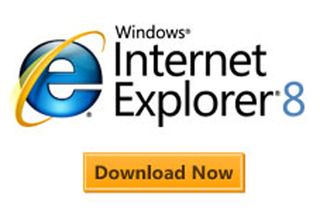Internet Explorer 8 ready for download today
IE8 has finally arrived, bringing new features, better performance and enhanced security in the hopes of fending off its browser rivals.

Microsoft has released the latest version of its web browser, Internet Explorer 8 (IE8).
It's been two and a half years since IE7 hit the web, and a year since the first beta of IE8, so it has some catching up to do, feature-wise. Microsoft promises new security tools, productivity enhancements and better performance, but whether or not that will be enough to staunch the flow of users to other browsers will take some time to assess.
Indeed, Internet Explorer is by far the dominant browser across the web, according to Net Applications. Last month IE held about 67 per cent of the market, down from highs over 80 per cent in 2006, but still well ahead of rival Firefox's 22 per cent.
But its market share has slowly been slipping in favour of rivals like Mozilla's Firefox, Apple's Safari and even Google's Chrome, which have all seen gains lately and have all been updated more frequently.
This time around, Microsoft is claiming better performance for IE8, though it's not claiming to be the fastest all the time. "It's a browser that works in the real world, it's not optimised for some tricky benchmark," Ryan Servatius, senior product manager for IE8, told IT PRO.
In tests against the top 25 most visited websites, Servatius said IE8 was sometimes the fastest, but when it was the slowest, it was only by a few hundredths of a second.
A faster browser isn't just performance speeds, but productivity, he added. The most interesting new feature for productivity is a tool called an accelerator. Click on an address, select the web service to apply it to say, a mapping service and IE8 will automatically open a new tab with the information inputted into that service, so surfers no longer need to copy and paste or flip between tabs to get something mapped, for example.
Get the ITPro. daily newsletter
Receive our latest news, industry updates, featured resources and more. Sign up today to receive our FREE report on AI cyber crime & security - newly updated for 2024.
Another productivity booster is a new search tool, which lets users search not just an engine's index, but a specific site. If you're looking for books, you can search Amazon's listings straight away, without even going to the Amazon website.
Another key change which some would say is a long time coming is compatibility. IE8 promises to be fully compatible, letting developers create web pages which work across multiple browsers. "This is critical as we advance the web platform forward," Servatius said.
For security, IE8 offers new domain highlighting to prevent spoofing, a less-subtle phishing alarm, and a stronger malware filter which scans not just the page, but the links attached to it as well.
The most interesting security addition is a new way to prevent cross site scripting, which is a hacking technique that adds script to a real page in order to steal logins and passwords. Rather than ask a complicated question to users or flag up the malicous scripting on the site, IE8 simply scrapes it from the page, fixing the flaw without user input.
IE8 will also feature a privacy mode not unlike that found in Chrome in addition to the ability to check a website's privacy policy from inside the browser. "What we want to do is make sure people understand the trade-offs," Microsoft's Windows business group head John Curran said. "To help them make informed decisions."
Will it be enough to keep IE on top in the browser wars? Click here to read how IE8 holds up against its rival browsers.




